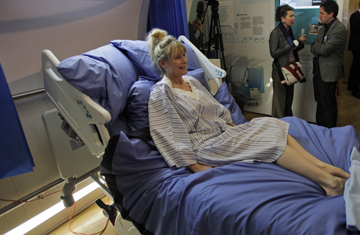
Europeans are gloating this week. The continent might be struggling with ballooning debts, a faltering euro and national strikes, but when the U.S. House voted in favor of President Barack Obama's health care bill Sunday night, March 21, Europeans seized the moment to thumb their noses at Americans and remind them that they've had pretty good health care for decades.
"On Sunday evening the richest, most powerful country in the world, the USA, finally entered the 20th century. Yes, not the 21st century, but the 20th," read an article published Monday on the popular French news website Rue89.com. The site also posted a copy of TIME's cover from Nov. 24, 2008, showing Obama as a contemporary Franklin D. Roosevelt, below which it placed a cartoon of Obama on the phone to French President Nicolas Sarkozy, saying, "Hi, Nicolas, how's your health?" The Dutch daily De Volkskrant noted that the change was a long time coming: "Where health care was until now a closed privilege, Obama and the Democrats have made it a law," read an article in the paper Monday. "One of the most important differences between America and other industrialized countries has finally been lifted."
Europeans have long expressed dismay at the fact that millions of Americans have no health insurance, and tales of American suffering are always in the media. One such article appeared in Monday's edition of Le Figaro, France's biggest morning paper, which focused on a young woman who is dying of breast cancer in New York City's Bellevue Hospital because she had no health coverage and didn't get her diagnosis in time. "She might live to see President Obama sign the law, but she won't benefit from it," the article said.
In Europe, voters demand that their governments offer good public services — including decent education and medical care — and regularly vote them out of office when they fail to deliver. Taxes may be slightly higher in Europe, but medical fees are heavily subsidized by governments and are drastically cheaper than they are in the U.S. The French, for example, pay a fixed $30 for a doctor's visit — and proposals to raise that fee even a few cents can ignite national protests. And in most of Europe, insurance companies are barred from rejecting applicants because of pre-existing conditions.
The fundamental difference between Europe and the U.S., Europeans believe, is that Americans regard public services as a bonus rather than a basic right. For some, this is evidence that the American system is deeply flawed. "It was a scandal that the world's richest country for so long offered its citizens such pitiful protection against illness or injury," wrote Gregor Peter Schmitz, Washington correspondent for Der Spiegel on its website Monday. "It seems entirely possible that, in 10 years time, Americans will find it hard to believe that they didn't always have the right to health insurance."
Aside from concern for the well-being of Americans, Europeans had another reason to want to see health care reform pass: Obama's political standing. Obama remains hugely popular in most of the continent, and European papers have treated the health care vote as a measure of the President's ability to push through his other policies. An editorial in Monday's Le Monde newspaper in France, titled simply "A Victory," referred not to the big news in France that day — the left's strong showing in the French regional elections — but to Obama's health care success. The President "succeeded where his predecessors have failed," the paper said, including the deeply unpopular George W. Bush, who it said "abandoned all ambitions on this issue."
With the health care victory in hand, Europeans will now want Obama to get back to issues more relevant to the continent, Schmitz wrote in Der Spiegel. While American politicians have battled over health care, "every other issue has become a sideshow," he says. "The Afghanistan mission: of marginal interest. Protecting the environment: postponed. Peace in the Middle East: off in the distance. Sanctions against Iran: delayed. Europe: not even worth a trip." Ouch.
